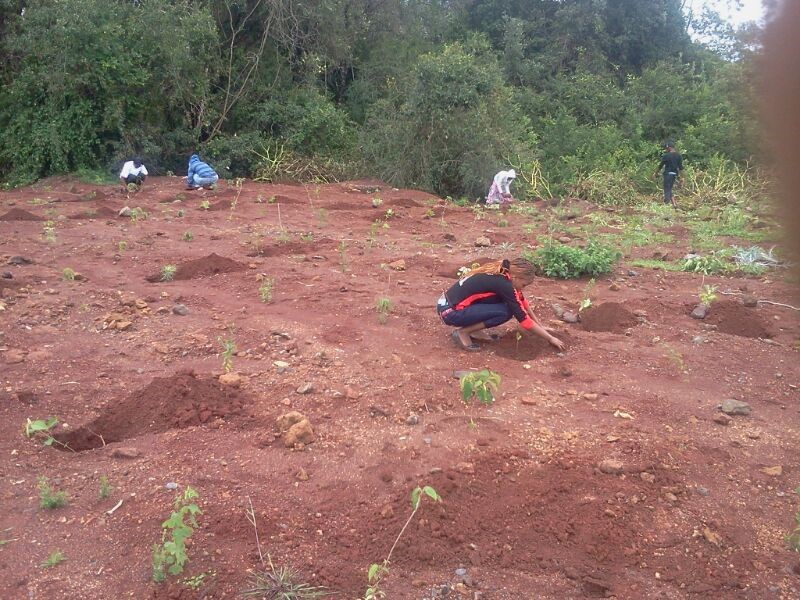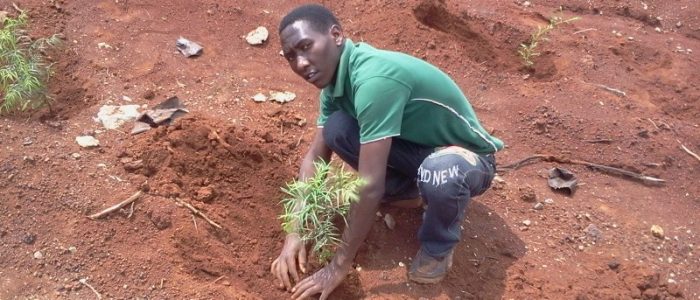HELPING YOU IN YOUR HEALTH NEEDS
Environmental Conservation and Protection
PIED promotes a safe, healthy, and clean environment by empowering and engaging communities in environmental conservation and protection for sustainable ecological balance. Increasing earth cover through afforestation, reforestation, and afforestation, reforestation, and wetland planting: Cutting of trees to create space for residential, industrial, or commercial projects means that less oxygen is produced accompanied by unstable ecological balance and extreme temperatures and rainfalls. PIED has been at the forefront of raising awareness of the importance of environmental conservation and protection through various mitigative activities which include;


Tree seed replacement
Tree seedlings replacement event in Ngong Forest along Lang’ata-Ngong Road By-pass during which weeds were cleared and 330 Tree seedlings replaced by a team of 27 youths
1. Tree Planting Program
Planting trees, grass, shrubs, or flowers in selected sites such as private or public land around schools, places of worship, community centers, local parks, recreational areas, and community gardens, among others. PIED in partnership with Kenya Forestry Research institutes has been planting trees in Kajiado county and other counties in the country. The goal is to increase forest cover, reduce global warming, purify the air, and control stormwater runoff.
2. Stream, Beach, and/or River Cleanups
These can be done by engaging communities in regular clean-up activities including removing trash and debris from rivers, beaches, or streams; or picking up litter/trash around your neighborhood. The goal is to remove physical hazards from the environment, reduce pollution of groundwater, and protect habitat structure.
3. Environmental awareness and education
This can be done by awareness raising and public education importance of maintaining a safe, clean, and healthy environment and encouraging stewardship; environmental Issues that affect human health such as chemical pollution, air pollution, climate change, and associated health risks and mitigation strategies; waste recycling and proper disposal of hazardous materials; and educating farmers to about of not filling in wetlands or benefits from reducing pesticide runoff.
4. Wildlife rescue and rehabilitation programs
Engage the community in protecting wildlife and preserving biodiversity through advocacy, care, and rehabilitation of animals and birds, among others.
5. Waste disposal and management
Waste management is a challenge in both developed and developing countries. Most developed countries dispose of their excessive amount of waste in the oceans. Developing countries such as Kenya do not have good waste management systems in place and thus face challenges with managing waste. Notably, nuclear, plastics, and electronic wastes can be particularly dangerous. Environmental waste disposal is costly and underscores the need for newer, more cost-effective as well as environmentally friendly waste management methods during generation and treatment to ensure safe disposal. PIED seeks to engage the community in raising awareness on proper waste management methods that include:
- Source Reduction: aims to reduce or eliminate waste prior to its generation;
- Avoid using plastic bags, straws as well as disposable water bottles, coffee cups, and single-use plastics;
- Reuse: Reusable materials and products can be reused to prolong their life.
- Recycling & composting by recovering valuable resources.
6. Pollution Management
Pollution of the air, water, and soil is caused by factors such as toxins and gases released by factories, combustion of fossil fuels, acid rain, oil spill, and industrial waste. Air pollution doesn’t just kill, however. It also contributes to other illnesses, hampers development, and causes various health problems, including stroke, heart disease, lung disease, and cancer. PIED endeavors to create awareness of the impacts of air, water, and soil pollution, advocate for use of alternative energy sources to reduce air pollution, and create awareness of the proper use of plastics, recycling, and disposal of plastics.
Join the community to support Environment Conservation
Contact Us.
-
Kasarani Youth Empowerment Centre, Chieko, P O BOX 58887-00200,
Nairobi, Kenya - Phone: (+254 700 331 267)
- Email: info@piedkenya.org

